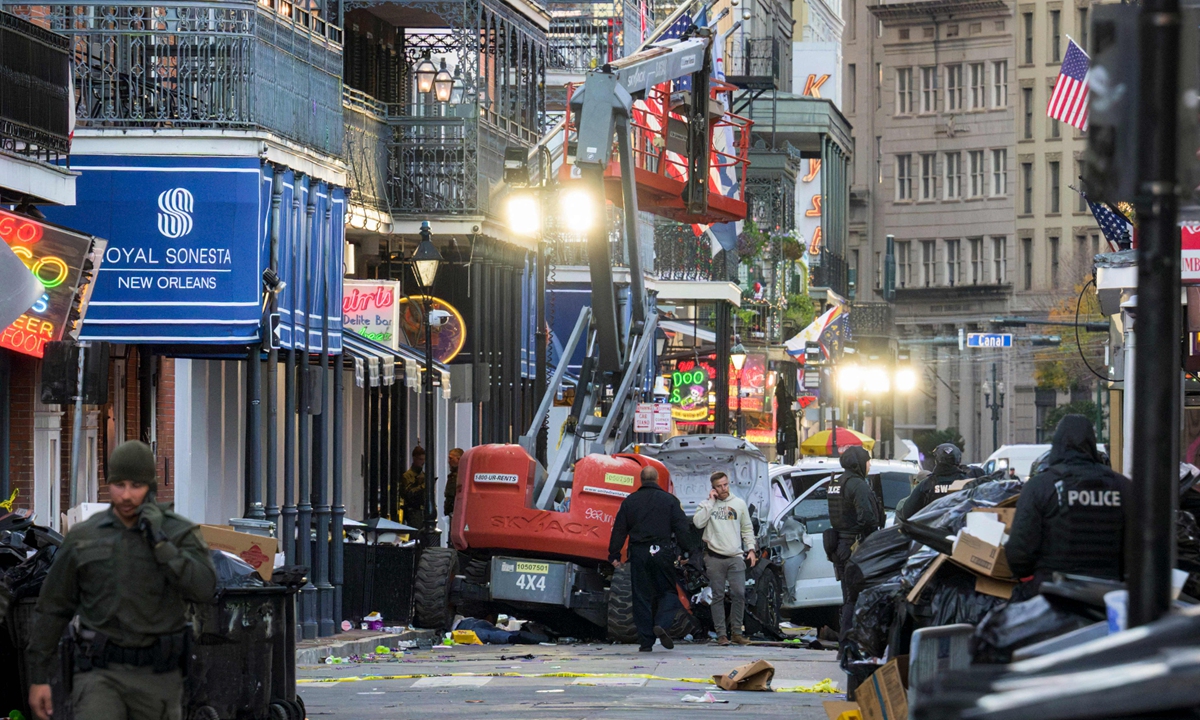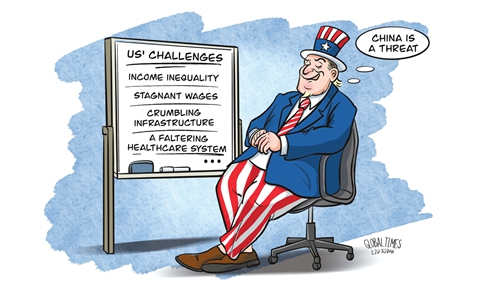
Police investigators surround a white truck that has been crashed into a work lift in the French Quarter of New Orleans, Louisiana, on January 1, 2025. The New Year's Day truck ramming killed at least 14 people and injured dozens more, CNN reported. Photo: VCG
Just how safe is America? Unfortunately, the country must again ask that question in light of a domestic terrorism incident, this one in New Orleans, Louisiana where a US citizen killed at least 14 people and injured dozens more after ramming the truck he was driving into a New Year's celebration unfolding in the city, and a suicide that could have turned into a similar incident had it taken innocent lives in Las Vegas, Nevada.
The bitter truth is that the perception and the reality of crime do not align in the US. In part, that means Americans must grapple with the fact that one person, often inspired by hate, anger or rage, can cause so much misery. Likewise, America's political leaders must do what they have previously not done: identify reasonable solutions to mitigate the risk of such events taking place.
Las Vegas police said that a suicide note included a warning to Americans that they were being led by "weak" people who only wanted to "enrich themselves."
Regarding the event in New Orleans, the FBI said that the driver acted alone and was 100 percent inspired by IS.
Americans should continue to ask just how safe their country is. The debate about what is domestic terrorism continues, but no one doubts that what took place on the starting days of 2025 was an example of it: One person, or a small group, often inspired by fanatical thinking or hate for a particular group of people, kills or injures many people.
Definitions of domestic terrorism vary. The FBI's definition includes "activities involving acts that are dangerous to human life" that seek to intimidate the population, influence government policy or affect the conduct of government. In examining domestic terrorism in the US during calendar year 2023, LawFareMedia concluded "threats emerged from different corners of the violent extremist landscape, including from racially and ethnically motivated violent extremists, anti-government and anti-authority violent extremists, and homegrown violent extremists."
Therefore, simplifying the debate down to its most basic elements, regardless of whether deaths from a mass shooting are classified as gun violence or domestic terrorism misses the point: Even though crime rates are declining throughout the US, there remains a palpable fear among millions of American citizens that they are not safe whether they are in their homes or in a public space. Their gender, faith, sexual orientation, political preferences and more could increase the chances of dying. That should not be happening in a country that promotes its belief in exceptionalism.
This crisis requires the country's leaders to meaningfully, openly and honestly engage in conversations about public safety. As for domestic terrorism, quibbling over its precise definition is a waste of time. Instead, there needs to be clarity on what policy changes might be required in order to prevent radical ideas from influencing otherwise ordinary citizens.
Doing all of that will not be easy. But the US has no choice. The fractured domestic political situation offers little hope. If addressing the challenges — including domestic terrorism — that exist in the US requires a bipartisan solution, then both sides appear more comfortable folding their arms across their chests and scowling at each other.
In short, leadership in facing real problems is missing. And that means discussing how to rein in domestic terrorism — and inequality and systemic racism and climate change and the list goes on — will almost certainly not happen.
The author is an associate professor at the Department of Communication and Organizational Leadership at Robert Morris University. opinion@globaltimes.com.cn


